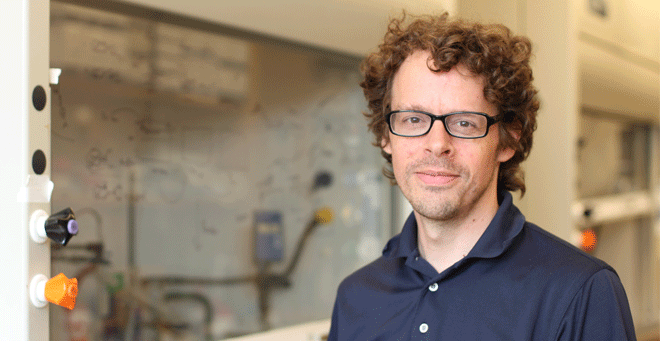 |
|
|
Stephen C. Miller, PhD |
Stephen C. Miller, PhD, associate professor of biochemistry & molecular pharmacology, received a 2016 McKnight Technological Innovations in Neuroscience Award for his work overcoming barriers to imaging in the brain.
Imaging in the brain is challenging, as many molecular probes are unable to cross the protective blood-brain barrier. Dr. Miller will use the McKnight award to spy on the inner workings of the brain using the bioluminescence of the firefly. Bioluminescence occurs when the luciferase enzyme acts upon its small molecule substrate, luciferin. Miller and his team have modified the natural firefly luciferin to improve its ability to access the brain, and to increase the sensitivity and selectivity of this technique for visualizing specific molecular events occurring in the brains of live animals. The glow of the brain can be used to detect gene expression and enzyme activity, monitor disease progression, or gauge the effectiveness of new drugs.
“Having grown up in Minneapolis, where the McKnight Foundation is based, this is a special honor for me,” Miller said. “I experienced first-hand the impact of McKnight’s support of the local arts community, and I am grateful now to be a recipient of their support with this award.”
Since the technology awards began in 1999, the McKnight Endowment Fund for Neuroscience has contributed more than $12 million to innovative technologies for neuroscience.
“It has been a thrill to see the ingenuity at work in developing new neurotechnologies,” said Markus Meister, PhD, chair of the awards committee and the Anne P. and Benjamin F. Biaggini professor of biological sciences at Caltech. “This year’s awards reflect the great untapped potential that still exists in visualizing the connectivity and function of the brain.”
The McKnight Endowment Fund for Neuroscience will grant $600,000 over two years for the 2016 McKnight Technological Innovations in Neuroscience Awards. Miller was one of three awardees selected by a committee of their peers from 76 applicants. Each will receive $200,000 to expand the range of technologies for studying the brain and its diseases and to make these new technologies available to the field of neuroscience.
Related stories on UMassMedNow:
New research shows bioluminescent probes light up enzyme activity in the brain
UMMS researchers show fruit flies have latent bioluminescence